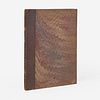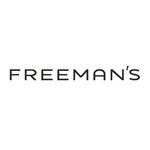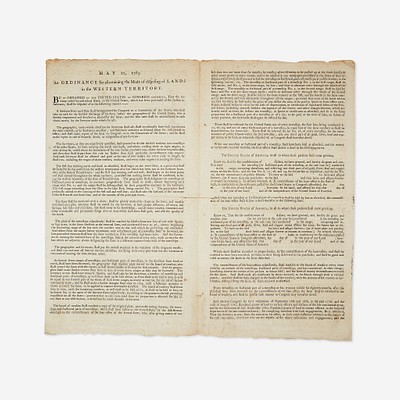[Philadelphia] [Lemon Hill] (Keyser, Charles S.) Lemon Hill, in its Connection with the Efforts of our Citizens and Councils to Obtain a Public Park
About Seller
2400 Market St
Philadelphia, PA 19147
United States
Established in 1805, Freeman’s Auction House holds tradition close, with a progressive mind-set towards marketing and promotion, along with access to a team of top experts in the auction business. And now with offices in New England, the Southeast, and on the West Coast, it has never been easier to ...Read more
Two ways to bid:
- Leave a max absentee bid and the platform will bid on your behalf up to your maximum bid during the live auction.
- Bid live during the auction and your bids will be submitted real-time to the auctioneer.
Bid Increments
| Price | Bid Increment |
|---|---|
| $0 | $25 |
| $500 | $50 |
| $1,000 | $100 |
| $2,000 | $200 |
| $3,000 | $250 |
| $5,000 | $500 |
| $10,000 | $1,000 |
| $20,000 | $2,000 |
| $30,000 | $2,500 |
| $50,000 | $5,000 |
| $100,000 | $10,000 |
About Auction
Feb 17, 2022
Freeman’s February 17 Books and Manuscripts auction is an Americana collector’s delight, with highlights led by an extremely rare Northwest Territory Land Ordinance from 1785. Curated by Darren WInston, Head of the Books and Manuscripts Department at Freeman's. Freeman's info@freemansauction.com
- Lot Description
[Philadelphia] [Lemon Hill] (Keyser, Charles S.) Lemon Hill, in its Connection with the Efforts of our Citizens and Councils to Obtain a Public Park
Philadelphia: For Private Distribution, 1856. Limited large-paper copy edition, one of only 20 printed. 4to, 10 3/8 x 7 1/2 in. (263 x 190 mm). 30 pp. Illustrated with an engraved frontispiece portrait of Thomas P. Cope, President of the Mercantile Library Co., Philadelphia, by (John) Sartain, after J. Neagle, dated 1848. Quarter brown morocco over marbled paper-covered boards, stamped in gilt, boards and extremities rubbed, spine rubbed and chipped; all edges trimmed; frontispiece foxed.
OCLC and Sabin (37696) locate copies with an 1856 Crissy & Markley imprint, but neither cites this privately distributed version of only 20 copies. Rare Book Hub yields only one copy, from 1917, which specifically indicates it as one of only 20 copies.
Lemon Hill was the birthplace of Fairmount Park in Philadelphia, the first property purchased by the city when it began creating the large sprawling recreational grounds that hug both sides of the Schuylkill River in the city's west and northwest regions. The land was originally part of Springettsbury Manor, a large tract of woods and farmland owned by William Penn, and named after his wife, Gulielma Springett. In the 18th-century the manor was broken up into smaller parcels, and three-hundred acres of it was purchased by American financier and land speculator, William Morris, for his Hills estate. It was later confiscated by his creditors upon his bankruptcy, and in 1799 wealthy Philadelphia merchant Henry Pratt bought 43 acres of the estate for $14,000 in a sheriff's sale. Between 1799-1800 he built Lemon Hill mansion, a federal-style home that sits high above a hill overlooking the Schuylkill River. By the Panic of 1837, the most severe economic slump to hit the country at that point, the estate had declined and had passed through numerous owners. By the early 1850s the property was being used as a beer garden, and was immensely popular with the city's German population, its gardens often used for the German community's Sangerfests. In 1855 the city purchased the grounds and declared it a public park, the first in what was to become the city's largest recreational grounds, totaling over 2,000 acres. The mansion underwent major renovations in the 1860s, and again in the 1920s, and in 1955 was opened to the public as an historic house.
From the library of bibliophile and long-standing Grolier Club member David Allen Fraser (1911-2003).
- Shipping Info
-
No lot may be removed from Freeman’s premises until the buyer has paid in full the purchase price therefor including Buyer’s Premium or has satisfied such terms that Freeman’s, in its sole discretion, shall require. Subject to the foregoing, all Property shall be paid for and removed by the buyer at his/ her expense within ten (10) days of sale and, if not so removed, may be sold by Freeman’s, or sent by Freeman’s to a third-party storage facility, at the sole risk and charge of the buyer(s), and Freeman’s may prohibit the buyer from participating, directly or indirectly, as a bidder or buyer in any future sale or sales. In addition to other remedies available to Freeman’s by law, Freeman’s reserves the right to impose a late charge of 1.5% per month of the total purchase price on any balance remaining ten (10) days after the day of sale. If Property is not removed by the buyer within ten (10) days, a handling charge of 2% of the total purchase price per month from the tenth day after the sale until removal by the buyer shall be payable to Freeman’s by the buyer. Freeman’s will not be responsible for any loss, damage, theft, or otherwise responsible for any goods left in Freeman’s possession after ten (10) days. If the foregoing conditions or any applicable provisions of law are not complied with, in addition to other remedies available to Freeman’s and the Consignor (including without limitation the right to hold the buyer(s) liable for the bid price) Freeman’s, at its option, may either cancel the sale, retaining as liquidated damages all payments made by the buyer(s), or resell the property. In such event, the buyer(s) shall remain liable for any deficiency in the original purchase price and will also be responsible for all costs, including warehousing, the expense of the ultimate sale, and Freeman’s commission at its regular rates together with all related and incidental charges, including legal fees. Payment is a precondition to removal. Payment shall be by cash, certified check or similar bank draft, or any other method approved by Freeman’s. Checks will not be deemed to constitute payment until cleared. Any exceptions must be made upon Freeman’s written approval of credit prior to sale. In addition, a defaulting buyer will be deemed to have granted and assigned to Freeman’s, a continuing security interest of first priority in any property or money of, or owing to such buyer in Freeman’ possession, and Freeman’s may retain and apply such property or money as collateral security for the obligations due to Freeman’s. Freeman’s shall have all of the rights accorded a secured party under the Pennsylvania Uniform Commercial Code.
-
- Buyer's Premium



 EUR
EUR CAD
CAD AUD
AUD GBP
GBP MXN
MXN HKD
HKD CNY
CNY MYR
MYR SEK
SEK SGD
SGD CHF
CHF THB
THB![[Philadelphia] [Lemon Hill] (Keyser, Charles S.) Lemon Hill, in its Connection with the Efforts of our Citizens and Councils to Obtain a Public Park](https://s1.img.bidsquare.com/item/l/1094/10945341.jpeg?t=1NcmVf)
![[Philadelphia] [Lemon Hill] (Keyser, Charles S.) Lemon Hill, in its Connection with the Efforts of our Citizens and Councils to Obtain a Public Park](https://s1.img.bidsquare.com/item/s/1094/10945341.jpeg?t=1NcmVf)











